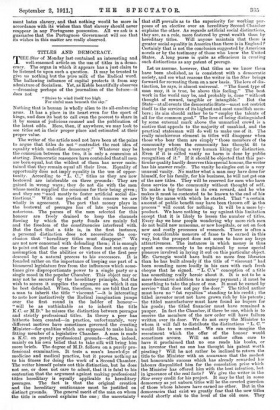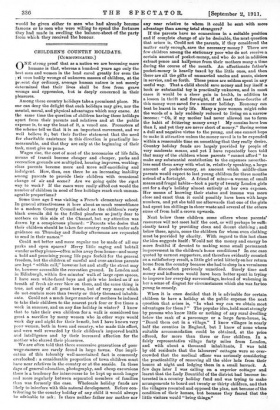TITLES AND DEMOCRACY. T HE Star of Monday last contained an
interesting and well-reasoned article on the use of titles in a demo- cracy. The organ in which it appears has a just claim to be listened to upon such a question. It may be trusted to give us nothing but the pure milk of the Radical word. The hallowing influence of capital protects it from any admixture of Socialism. Yet, as Keble beautifully observes —dreaming perhaps of the journalism of the future—it does not
" Strive to wind itself too high For sinful man beneath the sky."
Nothing that is human is wholly alien to its all-embracing arms. It has a place in its heart even for the sport of kings, and does its best to call even the poorest to share in it by means of judicious counsel and the publication of the latest odds. Here, then, if anywhere, we may look to see titles set in their proper place and estimated at their proper value.
The writer of the article need not have been at the pains to argue that titles do not " contradict the root idea of equality which underlies democracy." Whatever may be the connexion between the two, it is only a connexion at starting. Democratic reasoners have contended that all men are born equal, but the wildest of them has never main- tained that they remain equal all their lives. Equality of opportunity does not imply equality in the use of oppor- tunity. According to " L. C.," titles as they are now bestowed are intolerable on three grounds : They are gained in wrong ways ; they do not die with the men whose merits supplied the occasions for their being given ; and they are " used mostly to foster artificial social dis- tinctions." With one portion of this censure we are wholly in agreement. The part that money plays in the bestowal of peerages has of late years become notorious. The purses of the men selected for this honour are freely drained to keep the channels flowing by which the party funds are mainly fed and the freedom of the constituencies interfered with. But the fact that a title is, in the first instance, a personal distinction does not necessitate the con- clusion that " hereditary titles must disappear." We are not now concerned with defending them ; it is enough to point out that the case for them does not rest on any assumption that the abilities or virtues of the first peer descend by a natural process to his successors. It is founded rather on the importance of keeping one part of a bicameral legislature free from the influences which some- times give disproportionate power to a single party or a single mood in the popular Chamber. This object may or may not be secured by the hereditary principle, but the -wish to secure it supplies the argument on which it can be best defended. When, therefore, we are told that for a man to inherit the title " viscount "—it is interesting to note how instinctively the Radical imagination jumps over the first round in the ladder of honour- " will be as unthinkable as to inherit the title K.C. or M.D." he misses the distinction between peerages and strictly professional titles. In theory a peer has hitherto been created—in practice, unfortunately, very different motives have sometimes governed the creating Minister—for qualities which are supposed to make him a fitting member of a legislative Chamber. A man is made a K.C. on purely professional grounds—often, indeed, mainly on his own belief that to take silk will bring him more briefs. The degree of M.D. follows on a purely pro- fessional examination. It tests a man's knowledge of medicine and medical practice, but it proves nothing as to his fitness for doing the work of a Second Chamber. The writer himself points out this distinction, but he does not see, or does not care to admit, that it is fatal to his contention that the argument against making professional titles hereditary is equally applicable to hereditary peerages. The fact is that the original creation and the hereditary continuance must be justified on distinct grounds. The general merit of the man on whom the title is conferred explains the one ;. the uncertainty that still prevails as to the superiority for working pur- poses of an elective over an hereditary Second Chamber explains the other. As regards artificial social distinctions, they are, as a rule, more fostered by great wealth than by hereditary titles. Will anyone maintain that there is greater social equality in America than there is in England ? Certainly that is not the conclusion suggested by American novels or by the testimony of those who know the United States. A long purse is quite as efficacious in creating such distinctions as any patent of peerage.
Let us assume, however, that titles as we know them have been abolished, as is consistent with a democratic society, and see what reasons the writer in the Star brings forward for recreating them on a new basis. The love of dis- tinction, he says, is almost universal. " The finest type of man may, it is true, be above this feeling." The best work in the world may be, and probably is, done " without thought of reward, tangible or intangible." But the State—at all events the democratic State—must not restrict itself to the services of its highest and most unselfish mem- bers ; its aim should rather be to " employ the talents of all for the common good." The love of being distinguished by some external mark above the unmarked crowd is a motive that appeals to the majority of mankind, and the practical statesman will do well to make use of it. The really mischievous element in titles will disappear when those who bear them are simply " those members of the community whom the community has thought fit to honour by gratifying a very human liking for distinction. Even if it is called vanity no harm is done by public recognition of it." If it should be objected that this par- ticular quality hardly deserves this special honour, the writer has his answer ready. The vanity he singles out is a very unusual vanity. No matter what a man may have done for himself, for his family, for his business, he will not get one of the new titles. They will be reserved for men who have done service to the community without thought of self. To make a big fortune is its own reward, and he who makes it must be contented to be known to the end of his life by the name with which he started. That " a certain amount of public benefit may have been thrown off in the process " will count for nothing. It will be a mere by- product. We have nothing to say against this limitation except that it is likely to lessen the number of titles. Every day we hear people wondering why more rich men do not build new museums, or new hospitals, or set on foot new and costly processes of research. There is often a very considerable measure of fame to be earned in this way, but the prospect does not seem to have any large attractiveness. The instances in which money is thus spent are commonly to be explained by some special pleasure involved in laying it out on this particular object. Mr. Carnegie would have built no more free libraries than he has built already if the title of " viscount " had been sounding more loudly in his ears with each fresh cheque that he signed. " L. C.'s " conception of a title has something really heroic about it. It is not to be a mere decorative addition to a money payment ; it must be something to take the place of one. It must be earned by service " that does not pay the doer." The titled author must have no " fat royalties " standing to his credit ; the titled inventor must not have grown rich by his patents ; the titled manufacturer must have found no buyers for his goods ; the titled financier must have remained a pauper. In fact the Chamber, if there be one, which is to receive the members of the new order will have failure written over its door. We do not envy the Minister to whom it will fall to distribute the distinctions " L. C. " would like to see created. We can even imagine the resentment which the offer of the honour would sometimes arouse. Will an author often care to have it proclaimed that no one reads his books, or an inventor that no one has thought his patent worth pirating ? Will he not rather be inclined to return the title to the Minister with an assurance that the modest but honourable success which has already rewarded his labours disqualified him for the consolation prize which the Minister has offered him with the best intention, but in ignorance of the real facts ? We give the writer in the Star every credit for his project. It may be that in some democracy as vet unborn titles will be the coveted guerdon of those whose labours have earned no other. But in the democracies that exist we greatly fear that the new titles would shortly sink to the level of the old ones. They would be given either to men who had already become famous or to men who were willing to spend the fortunes they had made in swelling the balance-sheet of the party from which they received the honour.







































 Previous page
Previous page